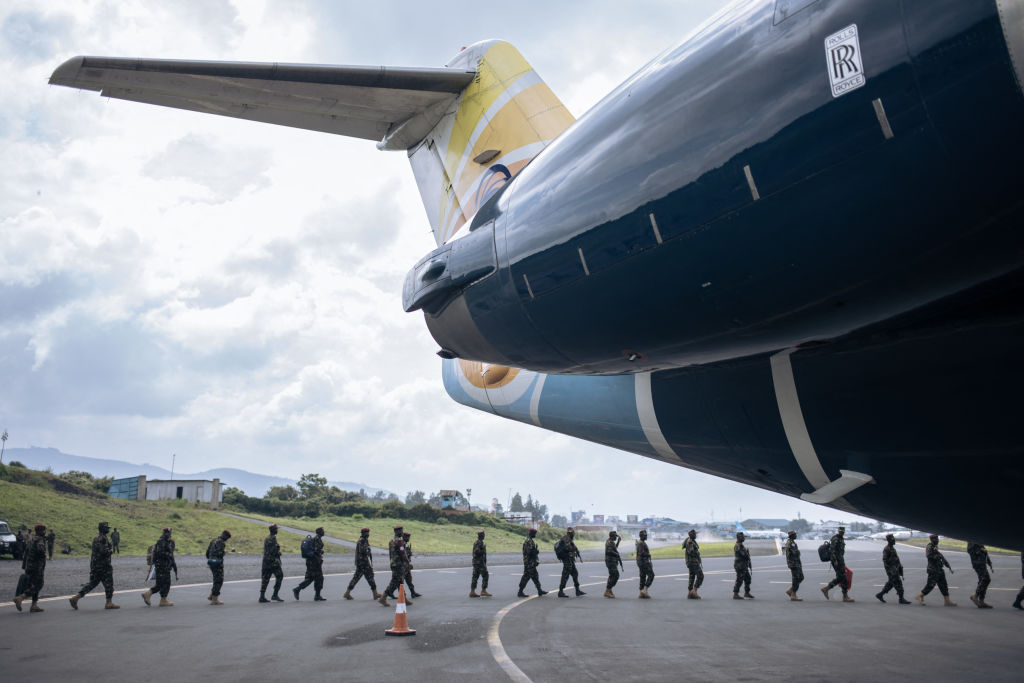ADF STAFF
Years of military missions have left civilian and political factions frustrated with intractable violence from a stew of armed groups operating in the eastern Democratic Republic of the Congo (DRC).
Now the East Africa Community Regional Force (EACRF), led by a contingent of the Kenya Defence Forces (KDF), is preparing to depart. A new force, organized and deployed by the Southern African Development Community (SADC), will try its hand at bringing peace and stability to the region.
Early on, the EACRF appeared at odds with the president and the people of the DRC. On December 3, Kenyan troops began withdrawing a week after authorities in Kinshasa and East Africa Community leaders agreed to end the force’s mandate.
Soon after the mission began, Kenya saw its participation as a regional duty. “It is our neighborhood, we have no choice,” Kenyan President William Ruto told Al-Jazeera. “We wish this could be done by someone else, but if we don’t get involved, it will get worse.”
The EACRF was composed of troops from Burundi, Kenya, South Sudan and Uganda. Rwanda, the DRC and Tanzania participated at the force headquarters in Goma, the capital of North Kivu province. The force deployed in Masisi, Nyiragongo and Rutshuru in North Kivu.
Its mandate, however, eventually came under criticism. DRC President Felix Tshisekedi publicly criticized EACRF Commander Maj. Gen. Jeff Nyagah of Kenya, claiming that forces were not doing enough to defeat M23 rebels, according to Kenya’s Daily Nation newspaper. Soon after, Tshisekedi announced that he would not renew the force’s mandate. Nyagah resigned April 27, 2023, citing threats to his security.
EACRF’s four-point mandate said it would plan and conduct operations with Congolese forces to defeat armed groups; help maintain law and order; collaborate with humanitarian organizations to serve people affected by armed groups; and support the Disarmament, Demobilization, Community Recovery and Stabilization Program.
Unrest and dissatisfaction did not begin with the EACRF. The United Nations peacekeeping force, MONUSCO, had operated in the DRC since July 2010. MONUSCO took over from a previous mission, MONUC, which started in late 1999.
MONUSCO has been the subject of persistent protests and civilian unrest. Tshisekedi called for the mission to depart by the end of December 2023. U.N. and DRC officials signed a disengagement plan on November 21.
“The acceleration of the withdrawal of the MONUSCO becomes an imperative necessity to ease tensions between the latter and our fellow citizens,” Tshisekedi said according to a September 2023 CNN report. He added that “peacekeeping missions deployed — in one form or another — for 25 years … have failed (to tackle) the rebellions and armed conflicts which are tearing the Republic apart.”
Similar criticism also plagued the EACRF. An unnamed diplomat told the Daily Nation on background that perceived failures of previous missions had kept funding from flowing to the EACRF’s military efforts.
In Goma on December 2, Lt. Gen. Francis Ogolla, Kenya’s chief of Defence Forces, said his troops had followed their mandate. “As KDF, we are satisfied to have delivered our role professionally with minimal collateral,” Ogolla said, according to the Daily Nation. “In any international mission, we must always respect and appreciate each other’s values, culture, and customs.”
As the EACRF departs, it does so after only one casualty: a Kenyan Soldier killed in late October by a mortar shell blamed on M23 rebels. As security is handed to yet another outside force, doubts remain about the ability to bring peace to the eastern DRC.
As the SADC Mission in the DRC (SAMIDRC) prepared to deploy, doubts remained about the prospects for peace in eastern DRC. SAMIDRC’s mission is to root out M23 rebels, according to Delphin R. Ntanyoma, a visiting researcher of the University of Leeds.
“This perspective tends to concentrate on the danger posed by M23 and disregards the armed groups (more than 120) operating in eastern Congo,” Ntanyoma, who is Congolese, wrote in a November 24, 2023, article for The Conversation. “Further, it tends to accommodate other armed groups that commit atrocities against civilians. In countering M23 attacks, the army has co-opted foreign and local militias, providing them with guns and ammunition.”
Ntanyoma continued: “The SADC mission in the DRC will, therefore, be taking on multiple rebel forces in a vast area with complex politics. It runs the risk of having its efforts criticised just like those of the East African Community because of its limited capacity to tackle the underlying causes of violence in eastern Congo.”

